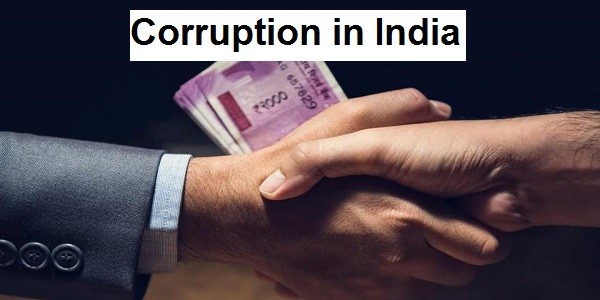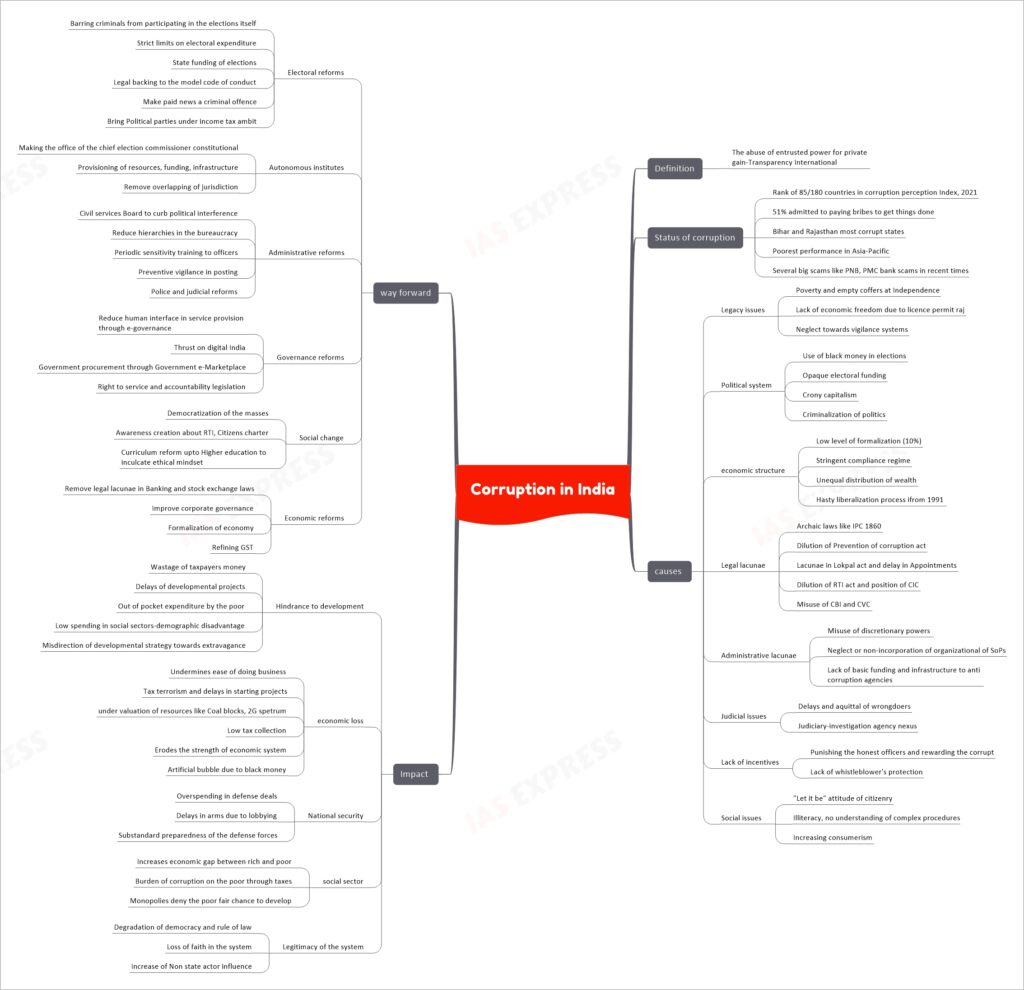Corruption in India: Status, Causes & Impacts

The menace of corruption is the most talked-about issue in India which grapples the sphere of public debate very often. The phenomenon touches every human being from the one living in slums to the person occupying the highest echelons of the State system. Just like the fictional Voldemort, corruption grows at every utterance of it. In the words of Kautilya “Just as it is impossible not to taste the honey that finds itself in the tip of the tongue, so it is impossible for a government assistant not to eat up, at least a bit of King’s revenue.”
This topic of “Corruption in India: Status, Causes & Impacts” is important from the perspective of the UPSC IAS Examination, which falls under General Studies Portion.
What is Corruption?
Transparency International (TI) defines corruption as “The abuse of entrusted power for private gain. It can be classified as grand, petty and political, depending on the amounts of money lost and the sector where it occurs”
What is the Status of corruption in India?
- In 2021, the country was ranked 85th out of 180 in the Corruption Perceptions Index, with the lowest-ranked countries perceived to have the most honest public sector. Corruption is caused by a variety of factors, including officials stealing money from government social welfare programmes.
- CPI, 2019 highlighted that unfair and opaque political financing, undue influence in decision-making and lobbying by powerful corporate interest groups, has resulted in stagnation or decline in the control of corruption.
- As per the India Corruption Survey 2019, 51% of the respondents admitted to paying bribes. Rajasthan and Bihar fared the worst in the country with 78% and 75% of respondents admitting to paying bribes.
What are the causes of corruption?
Inquiry into the causes of corruption presents a detailed picture of a socio-political-economic-administrative scenario that breeds corruption on a daily basis.
- Legacy issues–
- Rampant poverty and empty coffers of the government at the dawn of independence leading to chronic low salaries of the government officials.
- Pre liberalization license permit raj catered by Monopolies and restrictive trade practices facilitated the corruption. The lack of economic freedom led to abuse of the system.
- Necessities of development overshadowed vigilance procedures.
- Political system
- Use of black money in elections to win at any cost (breaching statutory spending limits) creates the need for the recovery of that cost through malpractices.
- Election funding is not transparent making it prone to the usage of black money and funding based on quid pro quo.
- It leads to crony capitalism, an unholy nexus between politicians and corporates.
- Criminalization of politics- when the rule-breakers become rule makers, the casualty is the rule of law.
- Economic structure
- Low levels of formalization (merely 10%) of the economy breed black money.
- Stringent compliance rules for entry and exit for businesses result in bribery.
- Unequal distribution of wealth- Transparency International data suggests that corruption is directly proportionate to the economic gap in a nation.
- Faulty process of liberalisation- we first opened ourselves to the world and then took to legislation for various sectors like FDI, resource auction making it easy for foreign companies to manipulate the system.
- Legal lacunae
- Archaic laws like IPC 1860 don’t capture the complexities of administration and lead to the escape of wrongdoers.
- Prevention of corruption act amendments-
- narrows down the definition of corruption,
- increases the burden of proof
- prior approval from the government for inquiry or investigation of officials
- Lacunae in the Lokpal act and delays in the appointments both at the state and central levels.
- Dilution of the RTI act and political misuse of CBI and other agencies.
- Administrative lacunae
- Loopholes give discretionary powers to the officials making working prone to corruption.
- Lack of resources, funding, infrastructure and manpower in the vigilance institutions.
- Lack of incorporation of standard practices by organizations like Banks, sports organizations which results in multi-billion-rupee scams. E.g. Punjab National Bank scam, commonwealth scam.
- Judicial delays
- Delays and dying away from the corruption cases at the judicial level due to lack of evidence or faulty investigation. It also showcases politician-public servant-judicial (lower levels) nexus.
- Lack of protection to good Samaritans
- Targeting of upright and non-corrupt officials and rewards to corrupt officials
- Near non-existent whistleblowers protection
- Social problems
- The mindset of the citizenry that doesn’t look at the problems seriously and even accepts it as a necessary part of the system.
- Illiteracy, poverty, and inability to understand complex procedures.
- Increasing consumerism in the new middle class that is ready to bribe to get things done.
- Failure of social morality, education system to inculcate the values.
What are the impacts of corruption?
- Hindrances to developmental process
- loss of wealth due to corruption and siphoning away of taxpayers’ money leave little to spend in the social sector.
- many developmental projects cannot be completed or get dragged for decades because of red-tapism, corruption cases raising the expenditure
- out of pocket expenditure by the poor to get things done creates a vicious cycle of poverty.
- Corruption in the social sectors like PDS, health and education schemes lead to demographic disadvantage.
- It misdirects developmental strategy from decentralized, directed projects to big-budget projects on account of crony capitalism.
- Economic loss
- Undermines ease of doing business
- Corruption in the public services sector carries high risks for conducting good businesses. Companies are likely to unwanted red tapes, petty corruption, bribes for finalizing any procedures or deals.
- Wrong allocation policies result in undervaluation of resources like Coal blocks, Hydrocarbon projects, Spectrum allocation. Eg. 2G scam, Coalgate. This mismanagement of resources leads to environmental degradation and exploitation.
- Low tax collection due to tax authority- corporate corruption. It results in low spending in the capital building.
- Corruption of financial sector officials like Banks, the stock market erodes the strength of the economy. E.g. PNB scam, PMC scam, Harshad Mehta scandal
- Rising black money artificially enhances the market capability which is always at the risk of collapse.
- Harmful to national security
- We have a history of corruption in defense procurement and consequent litigation. It undermines the preparedness of the armed.
- Corruption in the border security establishment creates problems of terrorist infiltration. Illegal migration has caused the issue of NRC implementation
- Social sector losses
- Corruption in government projects targeting poor and vulnerable section of the society increases the economic gap between the rich and the poor
- Corruption is always paid by the poor. The loss of exchequer by the big scams are always recovered by higher taxes. It hampers intergenerational parity in taxation.
- The corrupt system denies the poor a chance to improve their status rendering them eternally poor
- Loss of faith in the system
- On the political front, corruption is a major obstacle to democracy and the rule of law.
- It then leads to the loss of legitimacy of the political systems and gives free hand to non-state actors. E.g. Left-wing extremism
- Judicial corruption too undermines its legitimacy.
Way forward
There is a need for windfall reforms in each and every section of the system to fight the menace. Every aspect of governance must be improved for efficiency, economy, and effectiveness.
- Electoral reforms
- Barring the criminals from even participating in the elections as suggested by the election commission.
- Imposing limits on the overall expenditure of the political parties.
- Making state funding of elections a reality.
- Empowering ECI by giving legal force to MCC and making paid news a criminal offence.
- Strengthening of autonomous institutions
- Protecting the autonomy of CIC-giving him a constitutional status
- Provision of required manpower, infrastructure, training of vigilance agencies
- Eliminate overlapping of jurisdiction- e.g. Lokpal and CBI
- Administrative reforms
- Establishing the Civil Service Board to curb the excessive political control over the administration
- Reducing the hierarchy levels in the governments
- Conducting periodic sensitivity training for the civil servants
- Simplifying the disciplinary proceedings and strengthening preventive vigilance within the departments to ensure corrupt civil servant do not occupy the sensitive position
- Police and judicial reforms- implementation of Prakash Singh recommendations
- Governance reforms
- e-gov apart from advancing the good governance objectives of accountability and transparency also seeks to reduce the manual interface between state and citizen thus preventing the incidences of bribery
- Drives like Digital India projects like Government e-Marketplace must be implemented.
- Enactment of the right to service act. E.g. Rajasthan social accountability bill
- Economic reforms
- Negating legal lacunae in banking, stock market legislations.
- Improving corporate governance by implementing corporate governance committee reports
- Formalisation of the economy
- Refining and speedy implementation of GST
- Social sector improvements
As Transparency International chairman Delia Ferreira Rubio says, “People’s indifference is the best breeding ground to the corruption”. citizen empowerment is a basic need in the fight against corruption
- Awareness of citizenry by training them in RTI act, Citizens charter, social audits.
- Increasing democratization of the masses.
- Curriculum reforms to inculcate values even in higher education by which youngsters acquire high standards of ethical mindset.
Conclusion
Integrity, transparency, and fight against corruption have to be part of the culture. They must be thought of as fundamental values of the society we live in. corruption should not be seen as cancer to be eliminated root and branch for now. A practical approach would be to see it at obsession to be cured. An incremental approach to the problem will lead to an achievable target-setting and faster completion. People should be aware that they can change the system. India against corruption movement of 2011 was not the last fight as we have seen and it cannot be either. There has to be continuous checks and balances in the system. Corruption can be tackled effectively. But it needs homegrown solutions that eliminate indigenous problems.
Updates
- India has dropped to 82nd position in 2021, five places down from 77th rank last year, in a global list that ranks countries based on business bribery risks. The list by TRACE, an anti-bribery standard-setting organization, measures business bribery risk in 194 countries, territories, and autonomous and semi-autonomous regions.
- A strict anti-corruption law is “necessary” because corruption is hollowing out the country, the Centre told a five-judge constitution bench of the Supreme Court, which was considering whether public servants can be prosecuted for bribery if bribe givers fail to record their statements or turn hostile.



CORRUPTION IN INDIA
The development of India and its people and the future is irreparably destroyed due to the massive corruption, bribery and influence peddling. The rule of law is ignored. India is faced with absolute lawlessness, no one is safe and no one’s property is safe. The Higher Judiciary to take stern action against the corrupt politicians, executives and the who’s who of India. In pandemic the leaders have failed its people and caused massive death.
Ramesh Mishra
Victoria, British Columbia, Canada